Stephen Pewsey (born 1955 in Rochford, Essex) is a local historian and prolific author. He grew up in Southend-on-Sea, later living in Newham (Greater London), Loughton in Essex, and East Anglia.
Pewsey attended Southend High School for Boys and was a founder member of Southend Action Group for the Arts. He was later a founder member of the Beckton Residents Association, serving as its first Secretary, and was Secretary of the Loughton Residents Association 2007–18. He began his writing career in the 1970s contributing to local magazines.
He has served in various capacities on numerous heritage bodies, including the British Association for Local History (Publications Committee), Essex Archaeological & Historical Congress (Secretary 1996–99, Chairman 2008–11, President 2011–16), Essex Society for Archaeology & History, Loughton & District Historical Society, Newham History Society, and Wanstead Historical Society. He was Deputy Mayor of Loughton 2011–12 and Mayor in 2012–13, having also served on Loughton Town Council as Chairman of its Resources & General Services Committee and its Environment & Heritage Committee. He founded the Loughton Film Society in 2010, and was its first Chairman, and the Loughton Art Trail in 2014. He was also a committee member of the Loughton Festival, and was Vice-Chairman of the Lopping Endowment, a charitable trust which manages Lopping Hall, a community arts venue, in Loughton. He has acted as historical consultant for a wide range of heritage projects in Essex, East London and East Anglia.
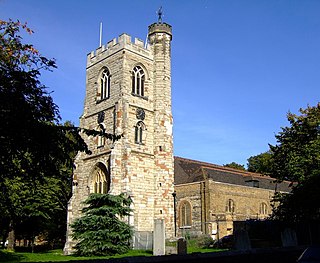
West Ham is a district in East London, England and is in the London Borough of Newham. It is an inner-city suburb located 6.1 mi (9.8 km) east of Charing Cross.
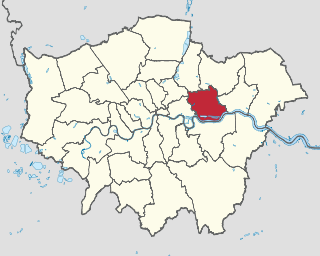
The London Borough of Newham is a London borough created in 1965 by the London Government Act 1963. It covers an area previously administered by the Essex county boroughs of West Ham and East Ham, authorities that were both abolished by the same act. The name Newham reflects its creation and combines the compass points of the old borough names. Situated in the Inner London part of East London, Newham has a population of 387,576, which is the fourth highest of the London boroughs and also makes it the 26th most populous district in England. The local authority is Newham London Borough Council.
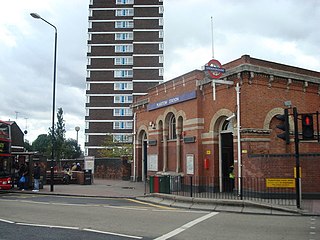
Plaistow is a suburban area of East London, England, within the London Borough of Newham. It adjoins Upton Park to the north, East Ham to the east, Beckton to the south, Canning Town to the south-west and West Ham to the west.

Shoeburyness, or simply Shoebury, is a coastal town in the City of Southend-on-Sea, in the ceremonial county of Essex, England; it lies 3 miles (5 km) east of the city centre. It was formerly a separate town until it was absorbed into Southend in 1933.

Saffron Walden is a market town in the Uttlesford district of Essex, England, 12 miles (19 km) north of Bishop's Stortford, 15 miles (24 km) south of Cambridge and 43 miles (69 km) north of London. It retains a rural appearance and some buildings of the medieval period. The population was 15,504 at the 2011 census and 16,613 in the 2021 census.

East Ham is a district of the London Borough of Newham, England, 8 miles (12.8 km) east of Charing Cross. Within the boundaries of the historic county of Essex, East Ham is identified in the London Plan as a Major Centre. The population is 76,186.

Loughton is a town and civil parish in the Epping Forest District of Essex, within the metropolitan and urban area of London, England. Situated 12 miles (19 km) north-east of Charing Cross, the town borders Waltham Abbey, Theydon Bois, Chigwell, Chingford, and Buckhurst Hill.
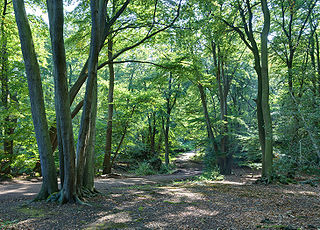
Epping Forest is a 2,400-hectare (5,900-acre) area of ancient woodland, and other established habitats, which straddles the border between Greater London and Essex. The main body of the forest stretches from Epping in the north, to Chingford on the edge of the London built-up area. South of Chingford the forest narrows, and forms a green corridor that extends deep into east London, as far as Forest Gate; the forest's position gives rise to its nickname, the Cockney Paradise. It is the largest forest in London.

Rayleigh is a market town and civil parish in the Rochford District in Essex, England; it is located between Chelmsford and Southend-on-Sea, 32 miles (51 km) east of central London. It had a population of 32,150 at the census in 2011.
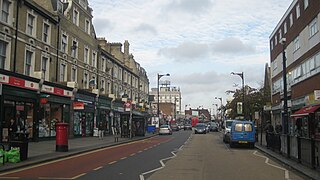
Forest Gate is a district in the London Borough of Newham, East London, England. It is located 7 miles (11 km) northeast of Charing Cross.

Beecroft Art Gallery is a gallery in Southend-on-Sea, Essex, England. The gallery is housed in a municipal building built in 1974 in the brutalist style. The Beecroft Art Gallery has a busy programme of changing exhibitions of art, photography and fashion. On the ground floor, the gallery presents temporary exhibitions of modern and contemporary artists, focusing on the work of emerging and established local artists. On the first floor, visitors can see works from the permanent collection and exciting fashion exhibitions.

Essex is a county in the East of England which originated as the ancient Kingdom of Essex and one of the seven kingdoms, or heptarchy, that went on to form the Kingdom of England.
Arthur Stanley Newens was a British Labour Co-operative politician. He was a Member of Parliament (MP) from 1964 to 1970 and 1974 to 1983, and a Member of the European Parliament (MEP) from 1984 to 1999.
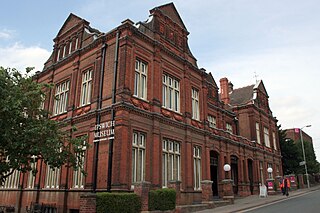
Ipswich Museum is a registered museum of culture, history and natural heritage, located in a Grade II* listed building on High Street in Ipswich, the county town of Suffolk. It was historically the leading regional museum in Suffolk, housing collections drawn from both the former counties of East Suffolk and West Suffolk, which were amalgamated in 1974.

Essex County Council is the county council that governs the non-metropolitan county of Essex in England. It has 75 councillors, elected from 70 divisions, and has been under Conservative majority control since 2001. The council meets at County Hall in the centre of Chelmsford. It is a member of the East of England Local Government Association.
Loughton is a town in the county of Essex in England. The first settlement can be traced back to 2,500 years ago, but the earliest records of the modern-day site of Loughton are from the Anglo-Saxon era of English history, when it was known as Lukintone. After the Norman conquest it became part of the estate of Waltham Abbey and is mentioned in the Domesday Book as Lochintuna. It was during the 17th century, however, when Loughton began to grow significantly as a coaching stop on the newly created main route to Cambridge and East Anglia. With good transport links and proximity to both London and also Epping Forest and the countryside, it became a popular location for aristocratic and wealthy Londoners to have a home.
Debden is a suburb in the civil parish of Loughton, in the Epping Forest district of Essex, England. It takes its name from the ancient manor of Debden, which lay at its northern end. The area is predominantly residential, but is also the location of Epping Forest College, East 15 Acting School and the De La Rue printing works. It is one of a limited number of places outside Greater London to be served by the London Underground.
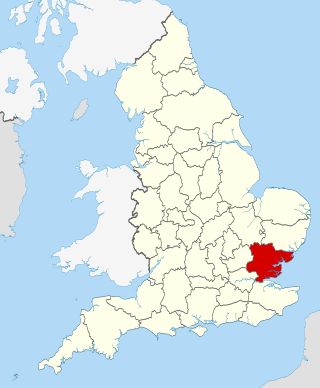
Essex is a ceremonial county in the East of England, and one of the home counties. It is bordered by Cambridgeshire and Suffolk to the north, the North Sea to the east, Kent across the Thames Estuary to the south, Greater London to the south-west, and Hertfordshire to the west. The largest settlement is Southend-on-Sea, and the county town is Chelmsford.

Sir William Wilkinson Addison was an English historian, writer and jurist. He is significant for his research and books on Essex and East Anglian subjects.
Christopher Charles Pond is a British historian, librarian, and local government politician.